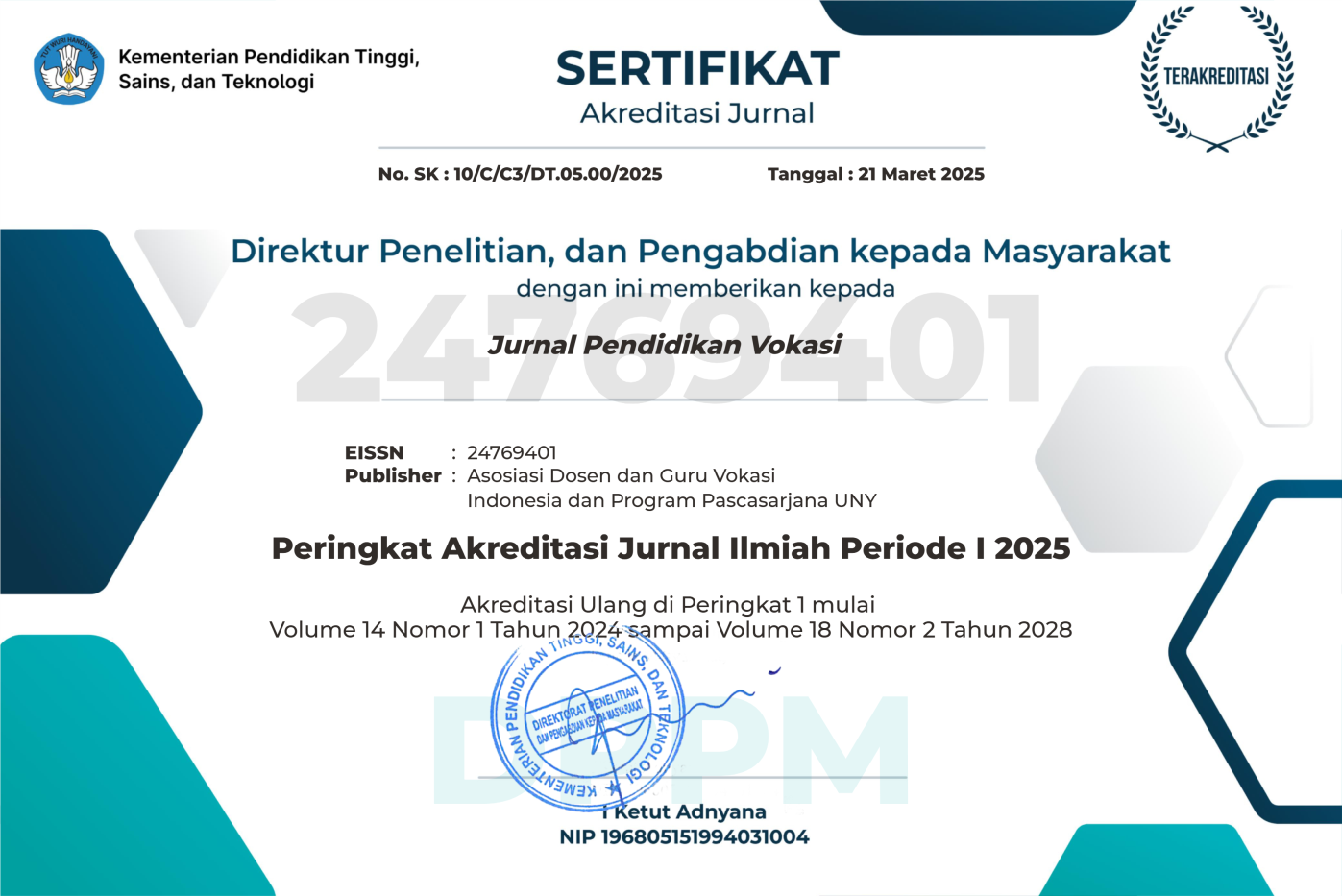The link and match of the demand and supply for productive vocational school teachers with regard to spectrum of vocational skills in the perspective of education decentralization
DOI:
https://doi.org/10.21831/jpv.v8i1.15135Keywords:
link and match, demand, supply.Abstract
The purpose of this study was to describe the pattern of link and match of the demand and supply for productive vocational school teachers which should be carried out in the future. This study is descriptive qualitative with the grounded theory approach. The unit of analysis consisted of: policy makers at central level; policy makers at local level; productive vocational school teachers; Teacher Education Institutes (LPTK), and Non-Teacher Education Institutes (Non-LPTK). The data were analyzed using the three phases: open coding, axial coding, and selective coding. The research results are as follows. (1) The pattern of the demand for productive vocational school teachers has been fulfilled through such programs as Three Year Diploma for Vocational Teacher of Engineering, Bond-based Remuneration for Bachelor's Level, Civil Servant Recruitment, Regional Civil Servant Recruitment, and Non-permanent Teachers. (2) Productive vocational school teachers supplied included LPTK graduates majoring in 22 vocational skills training programs and Non-LPTK graduates majoring in 45 vocational skills training programs out of 48 programs. (3) Productive vocational school teachers were distributed in three types of programs. (4) A system of vocational teacher education was conducted by increasing and refining. (5) Link and Match pattern of demand and supply for productive vocational school teachers involved integration of supply for LPTK graduates and that of Non-LPTK graduates, the distribution of such supply, and the pattern of implementation of vocational teacher education.
References
Charmaz, K. (2006). Constructing grounded theory a practical guide through qualitative analysis. London: SAGE Publications.
Cresswell, J. W. (2015). Penelitian kualitatif dan desain riset memilih di antara lima pendekatan. Yogyakarta: Pustaka Pelajar.
Ditjen Mandikdasmen. (2008). Spektrum keahlian SMK. Jakarta: Ditjen Mandikdasmen.
Ditjen Pendidikan Menengah. (2013). Spektrum keahlian SMK. Jakarta: Ditjen Pendidikan Menengah.
Ditjen Pendidikan Dasar dan Menengah. (2016). Spektrum keahlian SMK. Jakarta: Ditjen Mandikdasmen.
Djojonegoro, W. (1998). Pengembangan sumberdaya manusia melalui sekolah menengah kejuruan (SMK). Jakarta: PT. Jayakarta Agung Offset.
Jenner, R. G. (2010). Menghadapi melonjaknya kebutuhan guru SMK, P4TK-SB godok SDM siap alih fungsi. Retrieved September 16, 2017, from www.pppgkes.com.
Kementerian Pendidikan Nasional. (2010). Rencana strategis Kementerian Pendidikan Nasional 2010-2014. Jakarta: Kemdiknas.
Bona, M. F. (2016). SMK masih kekurangan guru produktif. Harian Suara Pembaruan, hlm.1.Retrieved Juni 24, 2016
Miles, M. B., & Huberman, A. M. (1992). Analisis data kualitatif (terjemahan Tjetjep Rohendi Rohidi). Jakarta: UI-Press.
Republik Indonesia (2003). Undang-Undang RI Nomor 20, Tahun 2003, tentang Sistem Pendidikan Nasional.
Sugiyono. (2009). Metode penelitian kuantitatif, kualitatif, dan R & D. Bandung: CV Alfabeta.
Team of YPPTI. (2010). Reposisi dan reorientasi pendidikan kejuruan menjelang 2020. Jakarta: YPPT
Tilaar, H.A.R. (2004). Pendidikan Indonesia masa depan (universitas dan pendidikan guru). Jakarta: UNJ Press.
Downloads
Published
How to Cite
Issue
Section
Citation Check
License
The authors submitting a manuscript to this journal agree that, if accepted for publication, copyright publishing of the submission shall be assigned to Jurnal Pendidikan Vokasi. However, even though the journal asks for a copyright transfer, the authors retain (or are granted back) significant scholarly rights.
The copyright transfer agreement form can be downloaded here: [JPV Copyright Transfer Agreement Form]
The copyright form should be signed originally and sent to the Editorial Office through email to jpvokasi@uny.ac.id
Jurnal Pendidikan Vokasi by http://journal.uny.ac.id/index.php/jpv is licensed under a Creative Commons Attribution-ShareAlike 4.0 International License.












